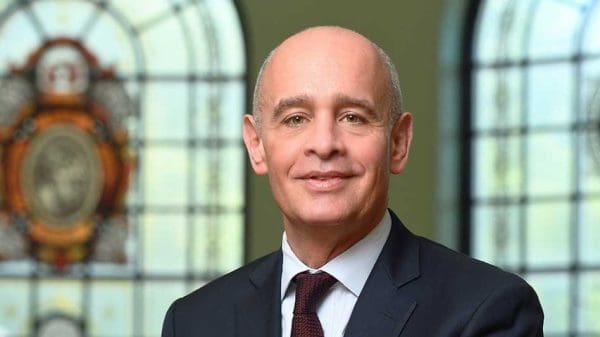At this time about a year ago, my work days were pretty predictable. Every morning my husband and I would load up our two dogs in the car and drive down I-83 to the Homewood campus. Once on campus, I would head to Mudd Hall, where I’ve been a faculty member (and more recently chair) in the biology department since 1998. My husband, Michael McCaffery, set off to the university’s Integrated Imaging Center. He is director of that center as well as a research professor in biology.
I loved my job. My days were spent conducting research on fundamental cellular processes using yeast cells, engaging with our remarkable students in the laboratory and classroom, and collaborating with faculty colleagues. When I was tapped last summer to be interim dean, I was honored and open to the opportunity to learn new things. I thought it would make for an interesting few months, and then I would return to my “real” life. Well, things didn’t quite turn out that way.
Being the interim dean of the Krieger School gave me a whole new view of this amazing institution. I got to know faculty members from other departments with whom I had never worked before or in some cases even met. I learned about exciting projects underway, like the new major in medicine, science, and humanities. I witnessed the passion students have for fields I never had a chance to explore before, such as museum studies and economics. The more I came to understand the seemingly endless breadth and reach of the school, the more I wanted to immerse myself in it. And so, after a great deal of deliberation, I threw my hat in the ring in the search for a new dean.
I knew I would be up against many extraordinarily qualified candidates. I’ll spare you the details of the strenuous interview process, but suffice it to say, when President Daniels offered me the position I was honored, humbled, and overjoyed, all at the same time.
As the newly named James B. Knapp Dean, my job now is to begin formulating a vision for the School of Arts and Sciences. Discussions with the president, the provost, our vice deans, faculty members, staff, and students have already led to the start of some long-term plans, and I want to share some of those with you.
One of my primary goals is to seek new opportunities for interdisciplinary innovation. By linking areas of expertise across disciplines, we lay the groundwork for creative discovery. We’ve already forged some unique partnerships with other divisions within Hopkins, most of them catalyzed by the Bloomberg Distinguished Professors, but so many more possibilities exist. One of our critical missions is to prepare our students to be leaders in the world. When our students—and their professors—are given the tools to explore ideas beyond the limits of their chosen fields, everyone thrives.
Another priority of mine is to explore innovative, effective ways to increase diversity within the Krieger School, particularly among our faculty. When our students graduate, we are sending them out into an extraordinarily multicultural world. No matter what their backgrounds, in order for them to succeed, they must be able to understand points of view, histories, sensitivities, and experiences other than their own. I’ve begun having conversations with professors, staff, alumni, and students to gather ideas about how we can shape the Krieger School faculty to be a more accurate reflection of the world around us.
A third goal I have is to shine a brighter spotlight on our outstanding humanities programs. In recent months, there have been numerous stories in the press that are “defending” the humanities; we need to stand up against this defensive posture and unapologetically proclaim their value. Now, perhaps more than ever before, a robust liberal arts education is the key to successful careers and fulfilling lives, and the humanities play a starring role. Our students who study the humanities graduate with the kind of expertise that every field needs: excellent writing skills, critical thinking and decision-making skills, the ability to ask intelligent questions and to communicate complex ideas. Study of the humanities gives all our students significant life skills that will enable them to succeed, no matter what their chosen major or future career path.
The Krieger School of Arts and Sciences is a leader in so many fields, and represents so many “firsts” in defining disciplines and areas of study. I want us to be known around the world as the standard-bearer in all of the disciplines we pursue while also breaking new ground by birthing the next generation of firsts.
I have now been the James B. Knapp Dean for about four months, and each day I still uncover new evidence of the Krieger School synergy that always has and always will lead to new knowledge. So, yes, my life has changed dramatically from this time last year—and I wouldn’t have it any other way.
Sincerely,
Beverly Wendland
James B. Knapp Dean


